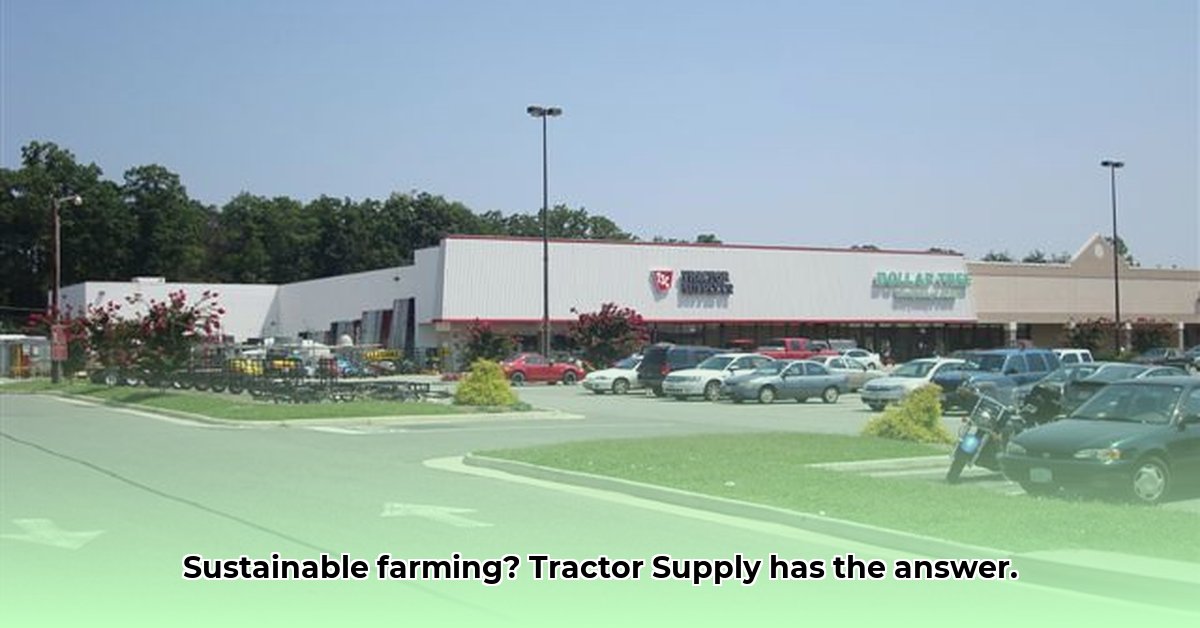
TSC's Role in Sustainable Agriculture in Bedford, Virginia
Tractor Supply Company (TSC) in Bedford, Virginia, plays a significant, albeit indirect, role in supporting local agriculture. While the store offers some products that contribute to sustainable farming practices, a substantial gap exists in the availability of truly sustainable alternatives. This article explores how TSC, local farmers, consumers, and TSC corporate can collaborate to enhance the store's positive impact on Bedford's agricultural sustainability. For more information on a similar TSC location, check out the South Boston TSC.
TSC's Current Offerings and Their Relation to Sustainability
The Bedford TSC offers a diverse range of products, some aligning with sustainable practices and others less so. Organic seeds are readily available, directly contributing to reduced pesticide use and healthier soil. Similarly, water-efficient irrigation systems help conserve a precious resource. However, the store's reliance on conventional fertilizers and pesticides raises environmental concerns. The absence of a wider selection of organic and biodynamic fertilizers, beneficial insect pest control solutions, and renewable energy solutions hinders its contribution to a truly sustainable agricultural ecosystem. Isn't it important that a store serving a community deeply rooted in agriculture reflect and support its values?
Challenges and Opportunities for a More Sustainable Future
The current situation presents key challenges and significant opportunities for improvement. The challenge lies in transitioning from a reliance on conventional inputs towards a more balanced offering of sustainable alternatives. The opportunity, however, lies in TSC proactively promoting and expanding its range of eco-friendly products. This could involve expanding its organic product lines, providing educational materials on sustainable farming practices, and forming partnerships with local sustainable agriculture organizations. By addressing its reliance on conventional products and broadening its sustainable offerings, TSC can significantly contribute to a healthier environment for Bedford's agricultural community.
Actionable Steps: A Collaborative Path to Sustainability
Transforming TSC Bedford into a leading force in sustainable agriculture requires concrete actions from multiple stakeholders:
For TSC Bedford:
- Conduct a Comprehensive Inventory Assessment: Analyze current stock to identify missing sustainable products aligned with local demand. (Efficacy: Improved product selection based on data-driven insights.)
- Implement a Targeted Marketing Strategy: Promote available sustainable options through in-store displays, engaging brochures, and targeted social media campaigns. (Efficacy: Increased awareness and sales of sustainable products.)
- Develop Strategic Community Partnerships: Collaborate with local farms and sustainable agriculture organizations to highlight best practices and build community trust. (Efficacy: Enhanced credibility and deeper community engagement.)
For Local Farmers:
- Thoroughly Evaluate Product Effectiveness: Compare sustainable alternatives against conventional options to assess cost-effectiveness and yield. This data-driven approach ensures informed decision-making.
- Explore Diversified Sourcing Strategies: Consider sourcing sustainable inputs from local suppliers and producers to ensure consistent access to needed products. (Efficacy: Increased access to sustainable inputs.)
For Local Consumers:
- Make Conscious Purchasing Decisions: Prioritize purchasing sustainably produced items to support businesses promoting eco-friendly practices. (Efficacy: Increased market demand for sustainable products.)
- Actively Support Local Sustainable Agriculture Initiatives: Support organizations and farms actively working towards a more sustainable agricultural future. (Efficacy: Fosters a supportive ecosystem for sustainable agriculture).
For TSC Corporate:
- Analyze Regional Demand for Sustainable Products: Conduct thorough research across all TSC stores to understand the demand for sustainable products to inform future product development and supply chain decisions. (Efficacy: Data-driven product development and supply chain optimization.)
- Develop and Implement a Comprehensive Corporate Sustainability Strategy: Integrate sustainability goals into the overall business strategy with clear targets and timelines. (Efficacy: Aligns corporate goals with environmentally responsible practices.)
Regulatory Considerations: Navigating the Legal Landscape
Adherence to regulations is critical. Compliance with USDA organic certifications and EPA guidelines is essential for building customer trust and ensuring ethical operations. Clear and transparent product labeling enhances accountability and reinforces a commitment to responsible practices. Isn't regulatory compliance a cornerstone of ethical and responsible business practices?
Conclusion: A Shared Vision for a Sustainable Future
TSC Bedford has the potential to be a powerful catalyst for sustainable agriculture in the community. Through collaborative efforts involving the store, local farmers, consumers, and TSC corporate, a healthier environment and a more sustainable agricultural future can be achieved. By actively embracing sustainable practices, TSC can not only benefit the environment but also strengthen its position as a trusted partner in the Bedford community. The journey towards a truly sustainable agricultural future is a shared responsibility, and with concerted effort, significant progress can be achieved.